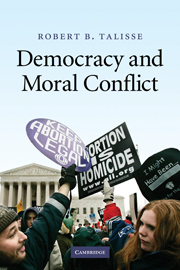1 - The problem of deep politics
Published online by Cambridge University Press: 03 December 2009
Summary
In the Introduction, I characterized the problem to which this book is addressed as that of finding an alternative to a Hobbesian war of all against all under conditions of moral pluralism. This characterization of the problem is, of course, very rough and imprecise. In order to make headway in understanding, and hopefully solving, the problem that moral pluralism sets for democratic politics, we will need to begin from a more detailed and nuanced analysis of that problem. This is what I provide in this chapter.
THE PARADOX OF DEMOCRATIC JUSTIFICATION
Framing the paradox
Imagine a society in which the legitimacy of the government – its institutions, procedures, laws, decisions, office-holders, and policies – is held to rest, at least indirectly, upon the consent of those it governs. Imagine further that action on the part of both the government and the citizenry is constrained by a set of rules specified in a public constitution. This constitution contains procedural provisions not only for holding regular elections, dividing political authority, checking political power, and punishing abuses, but also for its own criticism and revision. Additionally, let us say that the constitution specifies a set of protections for individuals from interference by the government, by foreign governments, and by other individuals, what is often referred to as a “menu” or “schedule” of rights and liberties. This menu specifies rights to hold and exchange property, to privacy, to equal protection under the law, to due process, and so on.
- Type
- Chapter
- Information
- Democracy and Moral Conflict , pp. 11 - 41Publisher: Cambridge University PressPrint publication year: 2009



